
Prescription Drug Disposal Guide & How To Dispose Of OTC Medication
As you are decluttering or just doing routine clean ups you may come across old, unused or expired medications that you no longer need or want.
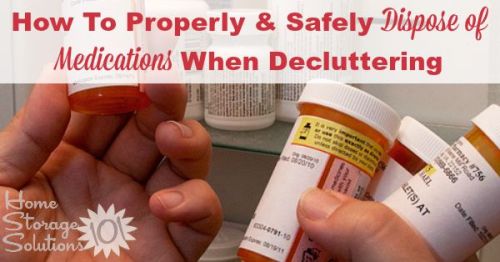
Here's a prescription drug disposal and over the counter medication disposal guide to make sure you follow proper safety and health precautions, as well as protect the environment, as you get these types of items out of your home.
Why This Is Important
Medications can make you feel better, but as you've no doubt warned your children about, they can just as easily make you sick if used improperly.
In addition, for some powerful narcotics, there is a potential for abuse, and you don't want your medications getting into the wrong hands.
Therefore, proper disposal keeps your family, the public, and the environment safe.
Different Medications Have Different Rules
Below I've discussed the general rules for medication disposal, but there are almost always exceptions to every rule.
I will provide links to several resources you can use if you have specific questions about your own medication.
The discussion below applies equally to both over the counter (OTC) and prescription medication, except where indicated.
Best Option: Prescription Drug Take-Back Programs
The most environmentally friendly and non-toxic way to dispose of prescription medications is through a medication take back program. These are often administered through your county sheriff’s office, pharmacy or hazardous waste facility. When you hand over your unused medicines as part of these programs then professionals can properly and safely dispose of the drugs instead of you having to worry about it.
The U.S. Drug Enforcement Administration (DEA) has annual National Prescription Drug Take-Back Events. There is a country-wide take-back event. The DEA website has been updated with locations, so if you're interested check it out now before the deadline to find out where, locally, they're taking back medications.
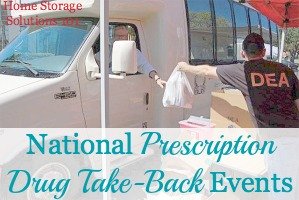
There are more local programs as well as this federal program, so make sure to research things in your local community as well to find out what options are available to you for medicine take back programs.
Finally, you can also check with your trash pick-up and recycling service to see if they offer a take-back program. In addition, check with your local pharamacist to see if they have knowledge about a local take-back program or other medicine disposal programs in your area.
Generally Trash Disposal Is Appropriate After Certain Procedures Are Followed
If you don't use a take-back program for whatever reason, check the label of your prescription bottle as the pharmacy will occasionally tell you how to dispose of the medication on the label.
However, if no such instructions are given, or for most over the counter medications, the general rule is that most medications (including prescription ones) can be disposed of in your household trash according to the Federal Food and Drug Administration (FDA).
Don't just dump them into the trash though. Instead, dispose of your medications by mixing them together with the yucky part of your trash, such as coffee grounds or kitty litter, and then tying the bag closed or sealing it in a can so that the prescription or OTC drugs don’t fall out of the bag.
This serves as a deterrent from anyone rifling through your trash to get unused pills, since it is in with nasty stuff.
Further, I've often heard the recommendation that you should crush up the pills first before trashing them. But no, actually you should not.
You should never crush old pills as you dispose of them as it can create medical dust in the air that can affect household members and pets or can be absorbed through your skin in a higher dose than intended. The potential side effects are not worth any additional deterrent effect.
Disposal Of Prescription Bottles & Blister Packs
When tossing your old prescription bottle in the trash remember to scratch out the prescription label so no one can get it refilled and to ensure the privacy of your health is maintained.
There are even more extreme steps you can take to keep people from getting into your used medications when you trash them. You use your own best judgment whether such extreme measures are necessary.
For example, the California State Board of Pharmacy recommends scratching off all patient data on the label, pouring a little water into the bottle with the pills still inside and then adding kitty litter or something you wouldn’t want to eat to the bottle. After that, replace the lid and then seal with duct tape.
Further, if the pills are in a blister pack, such as the type you pop out of the sheets, they suggest you wrap the blister packs multiple times in duct tape.
Finally, they instruct that once the container is sealed, place it in a box that doesn’t let anyone see what is inside and place it in your trash for normal trash pick up.
I'll be honest, that seems above and beyond to me, but I think the more dangerous the drugs the more important this becomes. My belief is to just use common sense and reason and take as much precaution as the situation demands.
Disposal Of Inhalers
Most inhalers have directions on how to dispose of them in their packaging. If you are unsure check with your pharamacist about the best way to dispose of your inhaler as disposal directions can vary from town to town and can depend on the year your inhaler was made.
For example, older inhalers may contain choloroflourocarbons (CFCs), which aren’t good for the environment, and may need to be disposed of in a hazardous waste facility. (The use of CFCs in inhalers was phased out at the end of 2013.)
If it is a newer inhaler the issue of CFCs isn't an issue, but these products are still aerosol products. As with any such products it can be dangerous if they are punctured or incinerated, so it is important to check what your local regulations are for safe disposal.
That's why it is important to double check with your local waste company as they may list additional resources such as local drop-off locations for medicine take-back programs that are ongoing at local pharmacies, hospitals or police stations.
Disposal Of Needles
If you need to dispose of needles used to treat diabetes or other illnesses, they need to be given special consideration and stored in a sharps container (available from your pharamacist).
Most pharamacies will take back the container when it is full. If they don’t, check with your local hospital as they may have a sharps disposal program for residents.
Should You Flush Medication? Usually No, But Very Rarely Yes
Another thing that I often hear people recommend doing with their expired drugs and medicines is to flush them down the sink or toilet.
However, that is in actuality not only not recommended by the FDA, but instead is discouraged because the drugs can enter and contaminate the water supply. While waste sewage treatment centers do try to filter out most of the chemical reside flushed medications add to the system they don’t get it all. So therefore the theory is, why flush when there are safer ways to do it?
However, as I explained above, there are always exceptions to the rule and there are a few medications that the FDA and EPA both agree should be flushed, instead of trashed.
Of course, keep in mind that instead of flushing it is always the best option to take such medications to a local or federal take-back program, but if you can't do that flushing is the next best alternative in just a few instances.
Basically, the reasoning for suggesting flushing of certain drugs is because of their extreme danger, such as fatality with a single dose, if they get into the wrong hands. In those instances the FDA has decided the risks from flushing are far less than the risks of misuse.
The FDA recommends flushing Oxycontin, Vicodin, Percocet and Morphine tablets amongst others to keep them out of reach of children, the landfills and others who may go through the trash.
Here's the full list of medications that the FDA suggests you should flush.
Additional Resources If You Have More Questions
The FDA continues to be the best, most up-to-date resource for both over the counter and prescription drug disposal. The FDA website has current information and lists of medications that need immediate disposal due to the high risk they can pose to others.
The FDA also offers a toll-free number if you need to call with questions: 1-888-INFO-FDA (1-888-463-6332).
Finally, don't forget about your local pharamacist. These folks will also have information about any drug take-back events that are scheduled to happen in your area and will have information about how to dispose of medications you have questions about.
Now that you know how to get rid of these medications while decluttering, make sure to declutter your old and expired medications in this Declutter 365 mission.
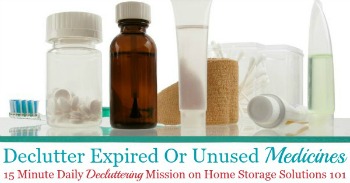
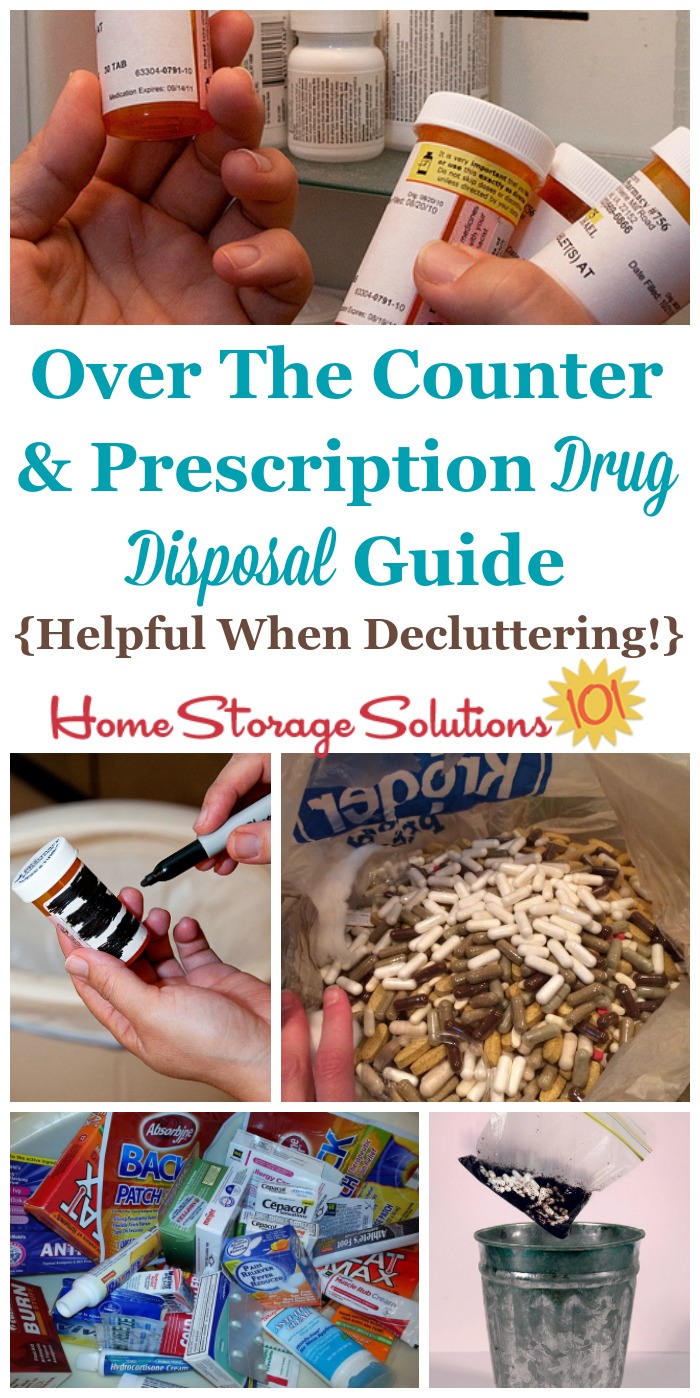
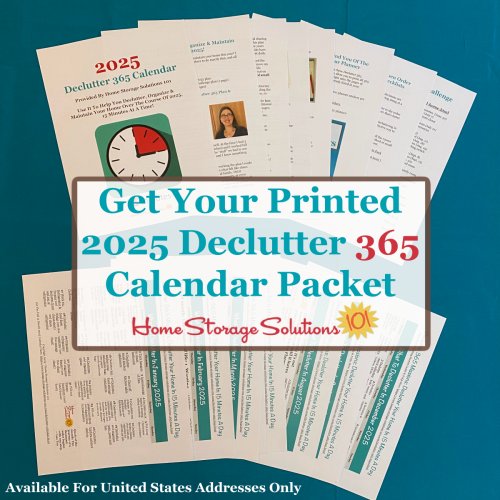
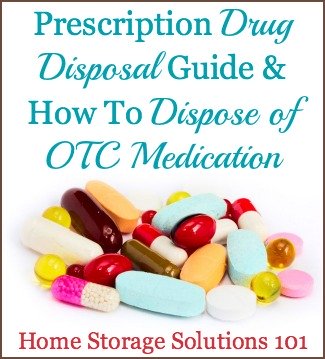

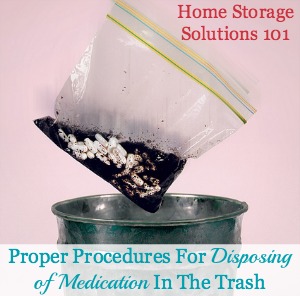
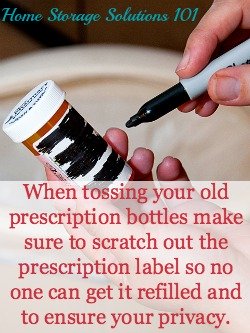
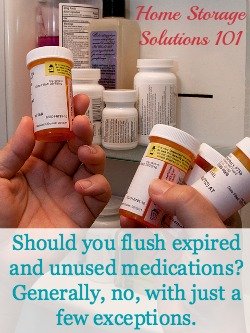
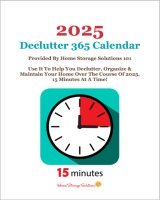
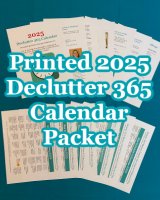
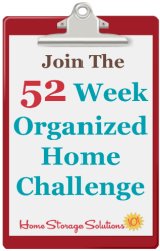



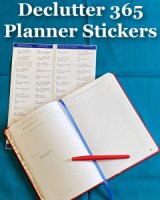

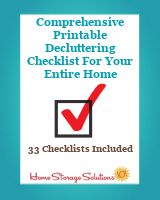





Share Your Comments, Tips & Ideas
I would love to hear from you, sharing your thoughts, questions, or ideas about this topic, so leave me a comment below. I try to always respond back!